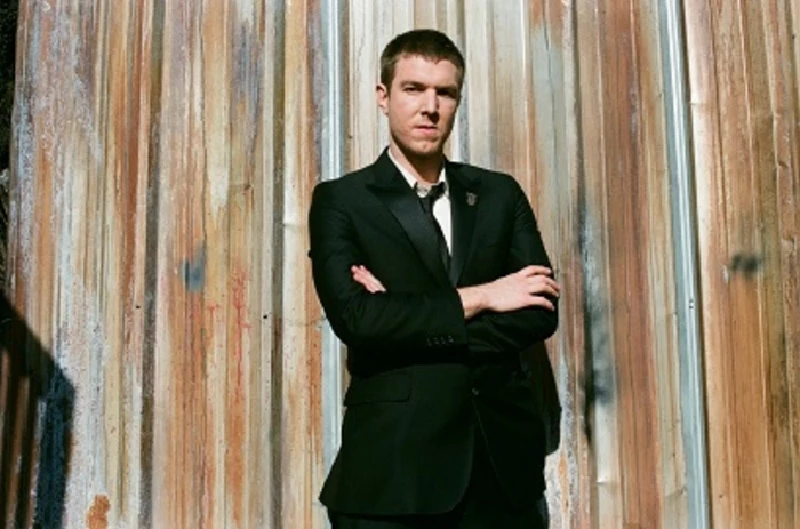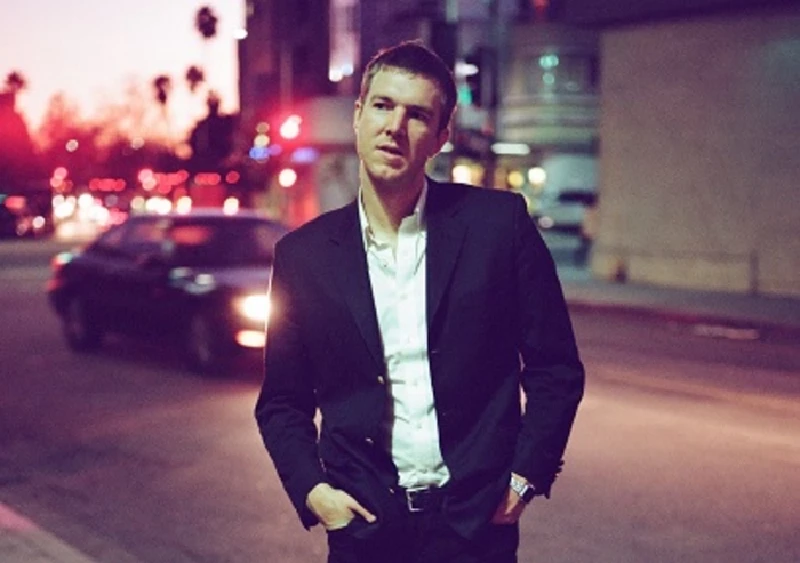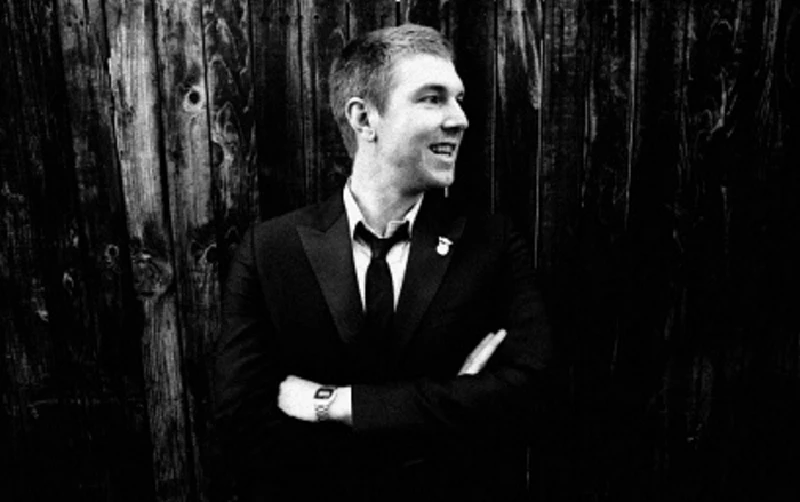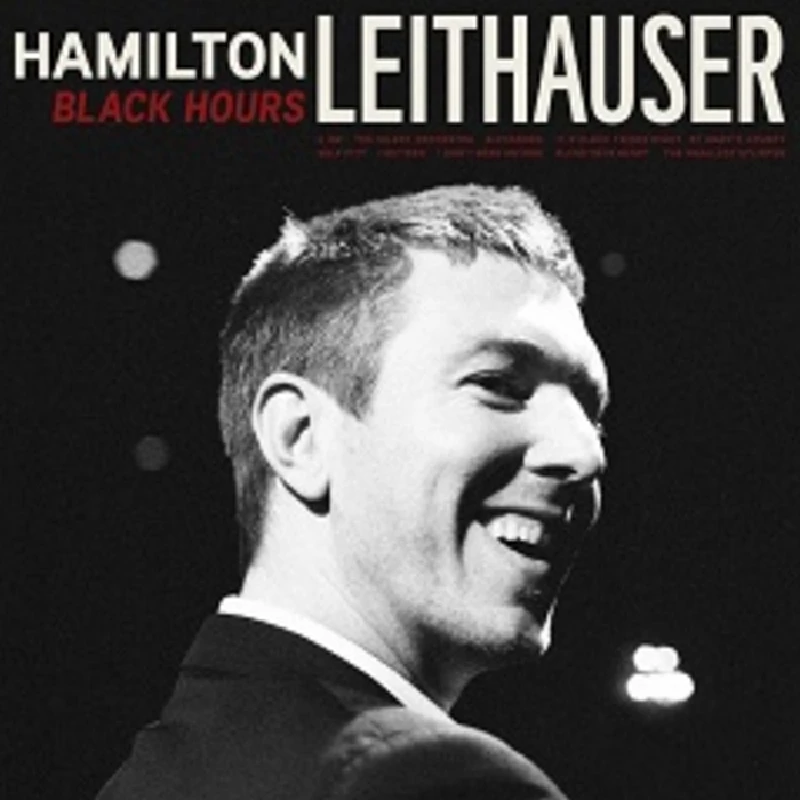Hamilton Leithauser - Interview
by Jamie Rowland
published: 9 / 2 / 2015

intro
Jamie Rowland chats to ex-Walkmen front man Hamilton Leithauser about his debut solo album, 'Black Hours'
Hamilton Leithauser found fame as the vocalist with New York indie rock band The Walkmen, but after thirteen years and seven albums, the band announced they were going on “extreme hiatus” at the end of 2013. Leithauser wasted no time in getting to work on his next project: his debut solo album, ‘Black Hours’. Featuring collaborations with the Walkmen’s Paul Maroon and members of Vampire Weekend, Dirty Projectors, Fleet Foxes and the Shins, the record has a big, confident sound, with catchy tunes and hair-raisingly good vocals from the always-reliable Hamilton. The styles vary from one song to the next, but fans of the Walkmen will inevitably see that band’s DNA running throughout. Following the release of ‘Black Hours’, Leithauser has toured the United States and played a number of festivals. In November this year, he came to the UK for a week-long tour. His band left at home, the songs were stripped back to their most basic elements: two guitars (Maroon came along for the tour) and Leithauser’s power-house vocals. Pennyblackmusic caught up with a very upbeat Leithauser on the final date of the tour - at London’s intimate Slaughtered Lamb – to talk about the music he grew up with, the struggles of in-band diplomacy and the shock of suddenly finding you’ve become ‘The Act’. PB: How has this UK tour gone for you? HL: The shows have been going really well. It’s really fun. There’s just two of us and it makes for very easy travel. But it’s very different playing like this. I mean I like it because it’s very personable and when you’re in a situation like this, where it’s just two of you, you’re less presented up on a stage, blowing people’s heads off with your volume and your rock songs. It’s more interactive and social. I like that. PB: Does the fact that you have a family and kids make touring more difficult? HL: No actually, to be honest I really enjoy it. I really had fun this week and also I just did a tour in the US with Spoon, and I did a tour with Broken Bells, and I did my own tour. And I really enjoyed all of them. Now it’s like you’re harder to be at home. It’s like you’re let out of the box – it’s like monkeys at the salad bar. Of course, it’s one of those things when you have kids that you’re gonna miss them, but… not that much. I mean Pete [Bauer] had a kid. I think he’s nine now. So the Walkmen’s schedule has been kid-friendly for nine years. I know what that’s like. It’s not that bad. It’s much worse for the wives, who get left at home. PB: That’s true. It does seem like you have the better end of the deal. HL: Yeah. I mean my wife, I just talked to her, and she’s about to explode. PB: So she’ll be asking for no more albums anytime soon then? HL: I mean… yeah, she’s definitely not thrilled whenever I tell her I’m going to do a tour. PB: Writing and releasing ‘Black Hours’ must have been a different experience for you. Although you had a lot of collaborators on the record, it’s your name on the album. It’s you who will ultimately, personally be credited with the songs and how they’re received, without the security of a band to cushion the blow. Did that worry you at all? HL: Honestly, I didn’t really think that through at first. The reason I did it as my name was because I didn’t want to have to come up with another band name. I got tired of the name ‘The Walkmen’ over the years. Not that I have any problem with it, but we came up with it fifteen years ago and you just get tired of living under this moniker. There comes a point where you lose a little connection with it. And I was just thinking, “I can’t get tired of my own name – it’s all I got.” So I just went with that. I didn’t really think about what it would mean in terms of perception. I didn’t think about it enough, because it is a lot weirder than I thought it would be. When you’re being written about and it’s just you, it just feels personal because it’s my name. I know it’s a business name, but it’s also my name, so that takes a little getting used to. People can write about the Walkmen - there’s been a lot written over the years, so I’m immune to either direction, honestly. But it is a shift when it’s your own name. The first couple of shows were weird because I’ve only ever gone out on stage as ‘the band’ in my life, since I was thirteen. So going out, and the band comes out and nobody claps, then you come out and the audience applauds - you realize you’re the act. I didn’t like that, to be honest. It started weird, and then it snowballed and got weirder and weirder; that realization hitting you in the face. PB: You seem to be enjoying it now, though! HL: Yeah, we’re having a great time. This tour has been really fun, because it’s just a very different experience for us. PB: What kind of music did you grow up with? HL: I grew up in Washington D.C. where at the time, when I was just a little too young to realize it, there was a pretty substantial music movement actually, when you look back; a pretty awesome scene where it was like the D.C. hardcore, DIY kind of indie music scene. Bad Brains started it and then Minor Threat came along. Actually my dad’s good friend - who I’ve known since… well, he knew me the day I was born – is Don Zientara, who started Inner Ear Studios. Don had this studio in his basement; it was this house in Arlington. It was this really kind of unremarkable, brick row house in Arlington, which is just a dull suburb. But then he just met randomly this local street kid, a neighbour – Ian MacKaye – who was like, “I’ve got this new band,” and they came in and just recorded Minor Threat and it sold 800,000 copies – out of MacKaye’s parents’ garage. And then Bad Brains came along, and all these badass guys were right there in Don’s basement. The basement of his actual house – it was just this little wall-to-wall space. So, I was always aware of that, but honestly that was something my dad knew about and I didn’t really care about until I got a little older. And then the Nation of Ulysses came along and Fugazi and stuff like that, and I was like, “Hold on, was that the band who was at Don’s house?” and I started realizing who Minor Threat was and I realized that I had been right there, but I wasn’t really paying attention. I was playing with my action figures and not really caring about it. PB: But then, you mentioned you started your own band when you were thirteen. HL: Yeah I think I was thirteen, fourteen. Something like that. PB: So was that when you were still into the Rolling Stones, or had you become aware of Minor Threat by then? HL: Right when I started the band, I was just utterly confused. I didn’t know what I wanted. We sounded like – well you know, just shit. But we sounded maybe like Jane’s Addiction. Just something where the bassist is slapping, the drummer’s playing some sort of crap and I’ve got the distortion on and just screaming. Nobody can even get through a song. So, I started there and then my older cousin Walter Martin and Paul [Maroon] – who’s with me tonight – were in this band Jonathan Fire*Eater, who were extremely hip in New York City. They really were at one point – here, too. They would have really been the cutting edge, they were much more arty. And they toured with the Cramps, so I went and saw the Cramps and that really sort of struck me, like “that’s the coolest thing I’ve ever seen.” So, I was sort of into that scene for a while and then it wasn’t until I discovered Jonathan Richman that I realized that like, he’s so cool; he’s this sincere kind of dork guy. That was so appealing to me when I was like twenty-one or something. PB: All of which would lead you to forming the Walkmen. When you released ‘Heaven’ in 2012, it had a very… what’s the word I’m looking for? You sounded like a band that was very… I’m trying to think of a word where it won’t sound like a euphemism for ‘boring’. HL: Boring! [laughs]. That sounds about right, sure. PB: That’s not what I mean at all! What I’m trying to say is you sound very content; it’s a very contented record. I don’t know if you feel that way, yourself. HL: Nah, I wouldn’t say that. Well… that makes sense as a listener. It didn’t feel that way making it, but I get that. I totally understand that actually. Making that record was a lot of work. It was a ton of work, but there was less frustration and banging our heads against the wall than there was when we were making something like ‘Lisbon’ in 2010, which I found just endlessly frustrating. And not in a good way – it makes a better story that the frustration is where you get to your core; I’m not so sure that’s always true. But with ‘Heaven’ it was steady progress, which was nice. We hired a producer for the first time on ‘Heaven’ and he did a great job, but what that did for me was push me back just a little bit from the final product because you go in and I sing all my parts and I play all my guitar parts and stuff, and then he asks you to do it again. And you go, “Okay, fine,” and you play it again, and then he tells you to play it again – and you sing it all and then he’s like, “Okay. Let me think about this.” So you go, “Okay, I’ll go have a drink. I’ll go fuck off somewhere”. So, there’s a lot of distance that suddenly comes between you and your song. I really liked what he did, so it was really cool to have this new guy in and this new sound. The reason we brought him in was because we wanted a new sound, so he did a great job. But one thing I really wanted to get to when I got to ‘Black Hours’ was, “I’m going to be here from the first second to the last second.” And I was, and I liked that more. I just did a song that – well, it was supposed to come out yesterday, but I couldn’t think of a title soon enough, so it’s going to come out next week [that song was eventually titled ‘Room for Forgiveness’ and released as a free download]. But I played every instrument on it and then I mixed it, and I did it all myself from start to finish. That’s what I like doing more right now, so I’m going to stick with doing that. I just enjoy doing it. I feel more personally connected to it. PB: That idea of a producer having that much of a say over a band or artist’s work has always been a little puzzling to me, like what the balance is there. HL: Well when you work in a group dynamic you find yourself in some funny spots sometimes, so that’s why that happens. It’s great because you have your friends to rely on – and that’s huge; I can miss that a lot of the time – but it also means you’ve got to deal with a group, and everybody’s personality and opinion. That can be a pain in the ass. A producer is like a manager of the operation, but you hope it’s a creative person too, and that also means you have to deal with his personality. And he and I maybe had some issues, but… PB: Well it’s a great album, I think it came out really well. Was it the process of making ‘Heaven’ that led you to want to do a solo record? HL: I’ve been thinking about that for a long time and I’m sure a lot of the other guys were too, because you know, the grass is always greener. But honestly, it was when ‘Heaven’ was done and then we were doing the album cover pictures that I sort of was just saying “yes” to everything and going along with everything, because I was tired of everybody dragging out issues. Everybody had to have an opinion and you just don’t want to be the naysayer, and so after you get to the point where you don’t really want to have a fight, then maybe you start slightly withdrawing. I started thinking I’d like to get back to the point where I cared. I mean I always cared, but I’d like to get back to the point where I’ll assert myself on everything, but I don’t want to get in a fight with anybody so maybe I’ll just do it with myself. Then I’ll be able to care and work on every needling detail and it won’t bother anybody. But I still work with Paul and this guy Rostam [Batmanglij, of Vampire Weekend] too, they were songwriters on this thing, so it’s not just one guy. PB: But if your name’s on the billboard, so to speak, I guess you’re going to have some extra pull. HL: [Laughs] I don’t know how that works. I guess you’re like the centrepiece, but… Yeah, I mean it’s my deal. It’s funny, because I didn’t ever consider myself as the guy who wants to be in charge. I always liked being in a group and it wasn’t like I had got to be independent. In terms of attention and being the person in the front, I really am not interested in that. Everybody must say that because it sounds good, but it’s true. I’m not doing this because I want to be ‘The Star’. PB: After you’d had the idea to go solo, were you writing songs and thinking “maybe I should hold this back,” or “this might not be right for the Walkmen, but it will work for me”? HL: You have that thought over the years, yeah. A lot of the times with songs – like Walt [Martin] just did a kids’ record, and I’m sure he had the same feeling, of: here’s a song I could bring into the group, but it’s like… It’s not that the guys couldn’t play it, but it’s more like you know the machine that it has to go through from beginning to end and you kind of don’t want to see that happen. You don’t want to deal with it and you know which direction it’s going to go. And that’s never a good sign, if you’re just dreading that - maybe you need to give it a rest. PB: What’s the next step once this tour is over? More touring in the US? HL: Yeah, I’m bringing the band back so we’re going to do a tour. I’m doing a show in New York and then I’m doing a tour with the band in the States. And I’m releasing ‘Room for Forgiveness’, which I’m pretty excited about, and then I’m working on a lot of music. I’m going to try and start releasing stuff regularly. I think it’d be kind of fun to be kind of like a serial; there’s always something coming out. PB: And then would you collect all that material up to release as an album? HL: Maybe, maybe. I guess you see where you stand. I don’t know if you can do that; I don’t know where the laws of recycling come in. But if you release a lot of singles then you can release a singles collection, right? Everybody does that. PB: Thank you.
Picture Gallery:-



most viewed articles
current edition
Carl Ewens - David Bowie 1964 to 1982 On Track: Every Album, Every SongArmory Show - Interview with Richard Jobson
Colin Blunstone - Thalia Hall, Chicago, 16/7/2025
Bathers - Photoscapes 1
Visor Fest - Valencia, Spain, 26/9/2025...27/9/2025
John McKay - Interview
Billie Eilish - O2 Arena, London, 10/7/2025
Robert Forster - Interview
Sir Tim Rice - Interview
Loft - Interview
previous editions
Heavenly - P.U.N.K. Girl EPManic Street Preachers - (Gig of a Lifetime) Millennium Stadium, Cardiff, December 1999
Beautiful South - Ten Songs That Made Me Love...
Pixies - Ten Songs That Made Me Love...
Oasis - Oasis, Earl's Court, London, 1995
Prolapse - Interview
Trudie Myerscough-Harris - Interview
Paul Clerehugh - Interview
Doris Brendel - Interview
Simon Heavisides - Destiny Stopped Screaming: The Life and Times of Adrian Borland
most viewed reviews
current edition
Sick Man of Europe - The Sick Man of EuropeLucy Spraggan - Other Sides of the Moon
Amy Macdonald - Is This What You've Been Waiting For?
Phew, Erika Kobayashi,, Dieter Moebius - Radium Girls
Davey Woodward - Mumbo in the Jumbo
Bush - I Beat Loneliness
Alice Cooper - The Revenge of Alice Cooper
Blueboy - 2
Cynthia Erivo - I Forgive You
Suzanne Vega - Flying With Angels
Pennyblackmusic Regular Contributors
Adrian Janes
Amanda J. Window
Andrew Twambley
Anthony Dhanendran
Benjamin Howarth
Cila Warncke
Daniel Cressey
Darren Aston
Dastardly
Dave Goodwin
Denzil Watson
Dominic B. Simpson
Eoghan Lyng
Fiona Hutchings
Harry Sherriff
Helen Tipping
Jamie Rowland
John Clarkson
Julie Cruickshank
Kimberly Bright
Lisa Torem
Maarten Schiethart